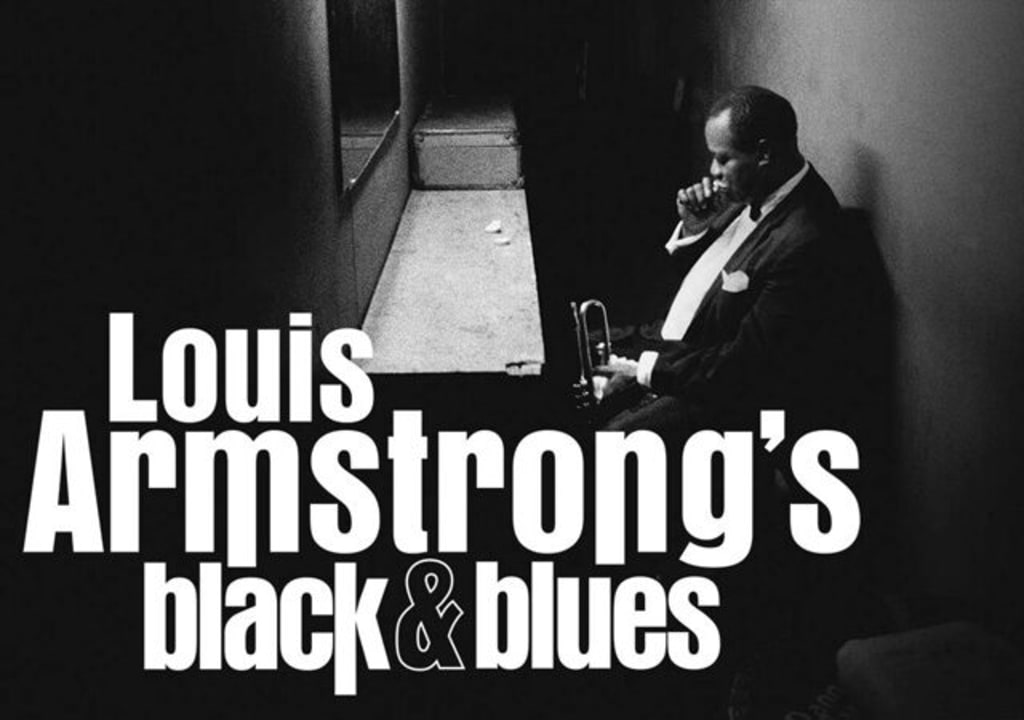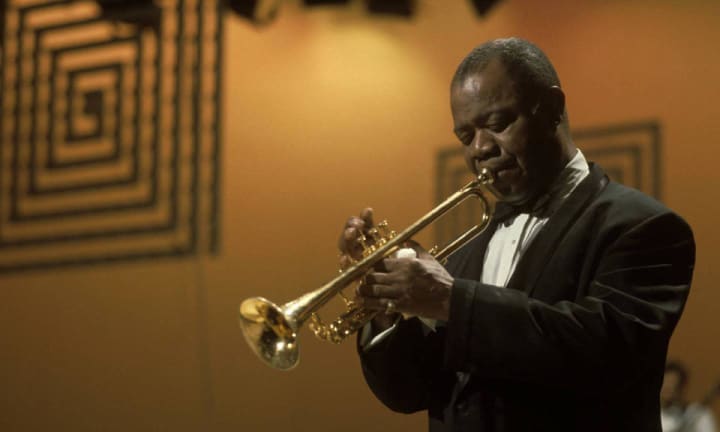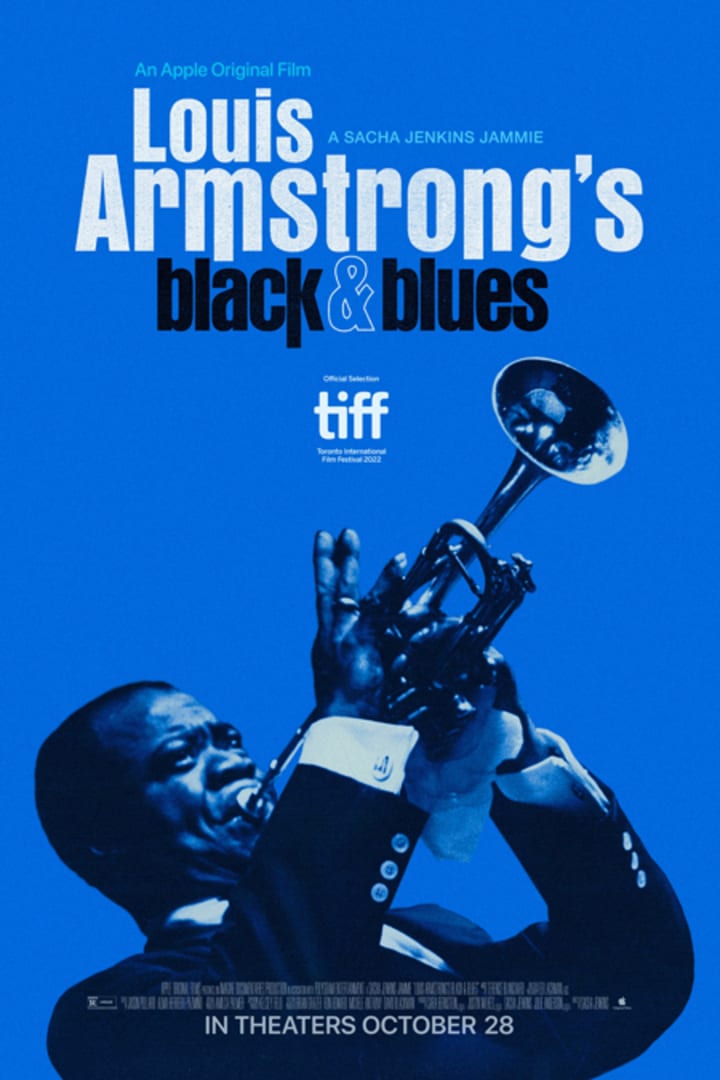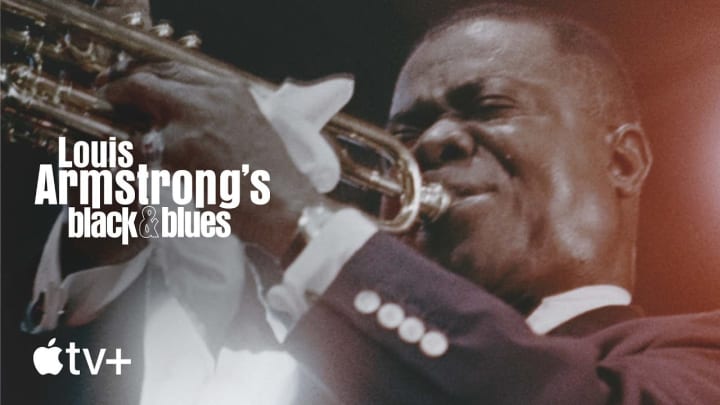Documentary Review: 'Louis Armstrong's Black and Blues' on Apple TV
Director Sacha Jenkins takes an extraordinary trip into the life of the legendary Louis Armstrong.

Louis Armstrong's Black and Blues (2022)
Directed by Sacha Jenkins
Written by Documentary
Starring Louis Armstrong, Wynton Marsalis
Release Date October 28th, 2022
Platform Apple TV
Published October 27th, 2022
At some point, the phrase 'Do you like Jazz?' became a cheesy signifier of pretension and oddity. Jazz is still wildly popular but it's settled into a niche that rarely breaks into mainstream success these days. Years ago however, that was not the case. Indeed, in the 40s and 50s, Jazz was fully in the mainstream. Much of that success could be attributed to the popularity of 'Satchmo' aka, Louis Armstrong. Arguably the greatest trumpet player of all time, Satchmo crossed racial lines and united fans of Jazz at a time when unity among white and black Americans was far from the norm.
The new documentary, Louis Armstrong's Black and Blues chronicles the life and career of Louis Armstrong in a way no other Armstrong project has. For years, Armstrong wore a big brave smile and stayed above the fray of American politics. It was his effort to remain as popular among all audiences but it came with the cost of many Black Americans believing that Louis Armstrong was selling out Black people to secure his own success in mainstream America. Through never before heard private recordings we find out how Armstrong really felt about his success, the racial divide, and other notable aspects of his life.

Louis Armstrong grew up in New Orleans and developed his talent for playing the trumpet at a very early age. As a teenager he honed his skills playing in brothels. But Armstrong was far too talented and too charismatic to go unnoticed. Eventually, Armstrong was brought on board with a touring band and his huge smile and brazen trumpet playing were the undeniable draw. By his mid-twenties, Satchmo had become a headliner, even in areas of white America and the south where the stage was the only place he was allowed to be because of his race.
Among Armstrong's earliest challenges was navigating the mob. Having moved to Chicago in the late 20s and 30s, Armstrong was forced to cope with connected club owners and promoters who used intimidation tactics to get him on stages but used the same tactics to take larger portions of Armstrong's earnings from those gigs. Eventually, Armstrong was forced to choose between gangsters who set his schedule and took his money and settled on one who took the lowest amount of his earnings.
Always a canny self-promoter, Armstrong turned to Hollywood to pick up paychecks and to spread his popularity as a singer and trumpet player. Word of mouth and recordings of his trumpet playing had made him a pretty big star but appearances on the big screen let Armstrong show off his winning smile, his innate charisma and a performance style unlike any other modern American musician. That voice, that gravelly, sad, yet joyous voice became as indelible and iconic as his legendary trumpet thanks to his appearances in movies that exposed his uniqueness to a wide audience.
What director Sacha Jenkins captures in Louis Armstrong's Black and Blues is Armstrong's uncanny talent for self promotion and his private struggle with racial injustice. Even being, arguably, the biggest Black American star in the country did not rescue Armstrong from the indignities of racial intolerance. One notable story, related in the documentary features the voice of rapper Nas reading a private letter that Armstrong wrote to a friend about his experience on a Hollywood movie set.

The anecdote is about a low level member of the crew who called the stars to the stage. The young white crew member would call upon the white stars with respect. ma'am's and sir's but was informal and rude toward Armstrong. Quickly tiring of the disrespect, Armstrong would flex his star muscle by telling the crew member that the production would wait until he was ready and when the crew member talked back, Armstrong replied that his band won't play without him.
The most notable and insightful anecdotes come from never before heard private recordings of Armstrong talking with friends and band members. In profanity laced conversations, Armstrong related his anger and frustration over the way he was treated by white audiences with a hint of bitterness toward black people for how they seemed to think he didn't do enough for the cause of racial justice. Indeed, Armstrong did shrink from such confrontations in public, taking the tact that white people bought his records as much or more than anyone.

This impression of Armstrong as a figure who pandered to white America took hold in the 1960s as an aging Armstrong sidestepped taking a role in the Civil Rights movement. Armstrong did provide financial support but was repeatedly at odds with other prominent entertainers who wanted to see him do more for the movement. Legendary actor Ossie Davis, someone who did take a prominent role in the Civil Rights movement relates a particularly insightful and intimate story about Armstrong and the duality of his public and private struggles. I will leave you to hear Davis' story for yourself in the documentary.
Louis Armstrong's Black and Blues is a must-see documentary, a fascinating, intimate and entertaining insight into a fascinating figure. Director Sacha Jenkins brilliantly captures Armstrong's life, struggles, and triumphs. It's a full and complete portrait of a man many think they know but was far more than just his gregarious personality and big wide smile. Black and Blues captures the life and the art of Louis Armstrong like no other Armstrong project. It does so with a fascinating style that is dynamic and deft, entertaining and enlightening.

Louis Armstrong's Black and Blues debuts on Apple TV on October 28th, 2022. Find my archive of more than 20 years and nearly 2000 movie reviews at SeanattheMovies.blogspot.com. Follow me on Twitter at PodcastSean. Follow the archive blog at SeanattheMovies. If you've enjoyed what you have read consider subscribing to my work here on Vocal. If you'd really like to support my writing you can make a monthly pledge or leave a one time tip. Thanks!
About the Creator
Sean Patrick
Hello, my name is Sean Patrick He/Him, and I am a film critic and podcast host for the I Hate Critics Movie Review Podcast I am a voting member of the Critics Choice Association, the group behind the annual Critics Choice Awards.






Comments
There are no comments for this story
Be the first to respond and start the conversation.